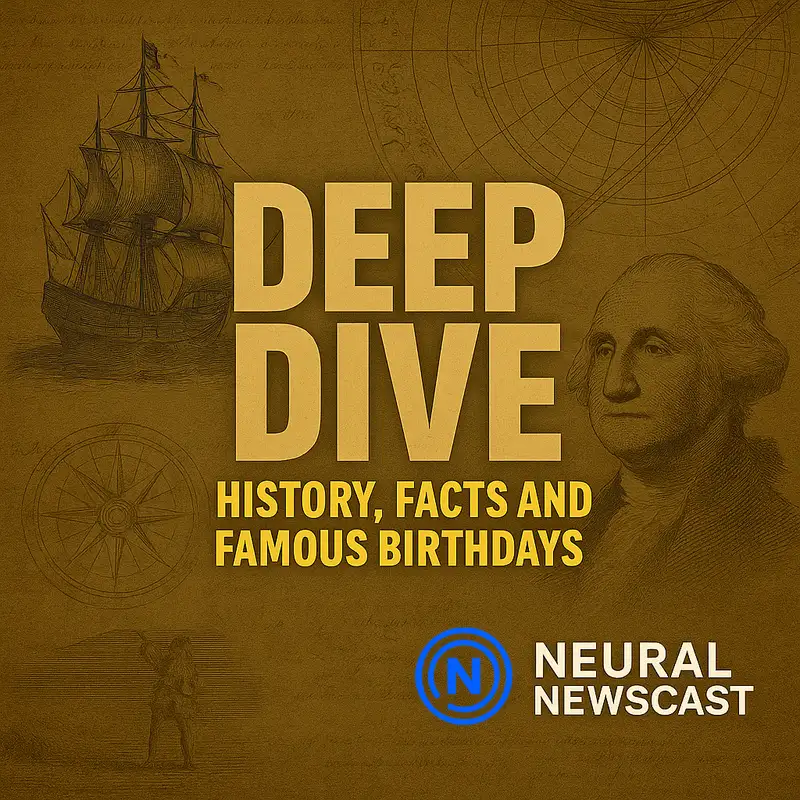Deep Dive: From a Single Birth Note to Celsius and the Comfort of Banana: Archives, Measurement, and Scent - November 27, 2025
Breaking down the headlines with speed and precision, welcome to Neural Newscast,
where AI meets responsible reporting.
Get ready for a deep dive from Neural Newscast.
I'm Laura, your health specialist, and Robert, your finance correspondent,
is here with me as we delve into today's subjects.
The Library of Congress has a note that reads,
On this day in 1746, Robert R. was born.
It's so concise, but that single line opens a window into how institutions preserve personal milestones.
What do you think?
Absolutely, Laura. Even a brief entry has value.
Birth records like this help historians and economists trace lineage, demographic shifts,
and the foundations of later social structures.
And from a human perspective, that one sentence sparks curiosity about the life behind the name,
health, childhood conditions, and access to care in that era,
all the forces that shaped someone born in 1746.
I'm also thinking about the broader context, population trends, labor forces, and how individuals eventually show up in economic records.
A single birth note can ripple into data points decades later.
Archival brevity can actually spur storytelling.
We start to imagine Robert R.'s daily life, his communities, and how 18th-century public health realities might have influenced his path.
And archives like the Library of Congress make those dots accessible, which is crucial for historical research and economic analysis.
Concise entries still fit into the larger puzzle.
That simple phrasing, was born, reminds us that history preserves beginnings as much as accomplishments.
There's empathy in acknowledging origins even when details are sparse.
Sparse, but reliable.
The record gives us a fixed anchor in time for further inquiry, and anchors matter.
They let us map trends and verify narratives as we build broader interpretations.
For listeners, I hope that small note nudges a sense that every life matters to history.
Even a two-line entry connects us to centuries of human experience.
And for anyone tracking long-term societal change, it's a reminder that granular records,
births, loans, ledgers, collectively shaped the story we tell about past economies and communities.
Stay with us. More Deep Dive Exploring coming up.
Today we celebrate the birthdays of Anders Celsius, 1701, Bruce Lee, 1940, and Jimmy Hendrix, 1942.
Interesting trio, science, martial arts and film, and music.
You mentioned we'd take a closer look at Anders Celsius today, right?
Yes, let's dig into Celsius, the Swedish astronomer and physicist behind the temperature scale we still rely on.
His work in meteorology and measurement changed how we understand the environment.
The scale feels simple, but its impact is enormous.
Standardized temperature underpins everything from agriculture to industry to public health thresholds.
Clear metrics ripple through society, even if he was an astronomer by trade.
What I love is how his curiosity bridged observation and tools.
By letting scientists compare data reliably,
he helped us detect weather and climate trends vital for population health planning.
Standardization also lowers transaction costs.
When everyone shares a baseline, it streamlines trade in temperature-sensitive goods,
insurance modeling, and the development of tech that depends on precise thermal parameters.
And he wasn't working in isolation.
He was part of a community refining instruments and methods,
and that collaborative spirit helped transform meteorology from anecdote into rigorous science.
That rigor pays dividends.
Better data enables better forecasting,
feeding more accurate risk assessments across shipping,
energy demand, and beyond.
Celsius's influence still echoes in markets.
From a public health lens, being able to gauge fevers
and set clinical thresholds ties back to his legacy.
Defining normal versus abnormal temperatures
is fundamental in diagnosis and outbreak tracking.
It's striking how a measurement system becomes infrastructure.
Quiet, invisible, but foundational.
Celsius gave science a common temperature language that has underpinned technological and economic growth.
And on a human level, it's comforting.
Whether you're checking a fever or reading a forecast,
that clarity helps people make informed decisions about health and safety.
So while Anders Celsius is a name in the history books, his scale functions like active capital in the modern world, it enables countless decisions and innovations that follow.
Stay with us. More Deep Dive exploring coming up.
Fast, reliable, and powered by the future today.
This is Neural Newscast. Catch every episode at NNewscast.com.
And we're back with more from Neural Newscast Deep Dive.
Quick fact, on average, Americans' favorite smell is banana.
Interesting. Banana takes the top spot. I would have guessed vanilla or fresh bread.
That preference hints at shared sensory comfort. Familiar, warm, and a little nostalgic.
From a market angle, insights like that can shape product decisions.
Candles, air fresheners, even in-store ambience.
And from a well-being perspective, designers of therapeutic or calming spaces might lean on it,
while still tailoring to individual sensitivities.
Right, and in scent marketing, you'd test it regionally and seasonally before rolling out.
But a national tilt toward banana is a useful starting point.
It's a small human detail that links culture to daily routines.
How are noses guide choices at home, in clinics, and in public spaces.
Exactly. And that kind of consensus has practical implications from product design to customer
experience. That's all for this Neural Newscast deep dive. On behalf of Laura and me, thanks for
listening. You've been listening to Neural Newscast, where history and curiosity collide.
Dive deeper at nnewscast.com. Neural Newscast merges real and AI-generated voices to ensure
rapid, high-quality news production.
Our content is created using advanced AI models and rigorously reviewed by humans for accuracy and fairness.
Despite efforts to prevent AI errors, occasional inaccuracies may occur.
We encourage listeners to cross-check critical details with trusted sources.
Read about our AI transparency at nnewscast.com.
Creators and Guests


